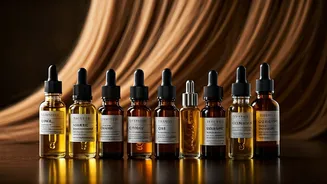Castor Oil's Power
Castor oil is a highly regarded oil for hair growth, thanks to its high concentration of ricinoleic acid, which stimulates blood circulation in the scalp.
This improved circulation can promote hair growth and strengthen hair follicles. The thick consistency of castor oil also helps in moisturizing the hair, reducing breakage and split ends. When using castor oil, applying it directly to the scalp and massaging it gently can enhance its absorption. It's often recommended to leave the oil on for a few hours or overnight, followed by thorough washing with a mild shampoo. Regular use of castor oil can lead to noticeably thicker and longer hair over time.
Argan Oil's Benefits
Argan oil, often called 'liquid gold,' is celebrated for its ability to moisturize and add shine to hair. Rich in antioxidants, vitamin E, and essential fatty acids, it protects hair from environmental damage and boosts elasticity, reducing breakage. Argan oil penetrates the hair shaft, providing deep hydration and making the hair softer and more manageable. Regular application of argan oil can result in a reduction of frizz and an overall improvement in hair texture. It is a lightweight oil and is ideal for all hair types. Apply a small amount to damp or dry hair, focusing on the ends, to experience its smoothing and revitalizing effects.
Coconut Oil's Excellence
Coconut oil is a versatile oil praised for its ability to penetrate the hair shaft and hydrate deeply. It helps to prevent protein loss, a common cause of hair damage. The lauric acid in coconut oil allows it to penetrate the hair more effectively than many other oils. It also acts as a natural conditioner, leaving hair soft, shiny, and less prone to breakage. For optimal results, apply coconut oil to your hair before washing, either as a pre-shampoo treatment or a deep conditioning mask. Its regular use can help improve the overall health and appearance of your hair, making it a staple in many hair care routines. Additionally, coconut oil is known for its pleasant fragrance.
Jojoba Oil's Versatility
Jojoba oil closely resembles the natural sebum produced by the scalp, making it an excellent moisturizer. It helps to balance the scalp's oil production, which is beneficial for both dry and oily hair. This oil is lightweight and non-greasy, making it suitable for all hair types. Jojoba oil is rich in vitamins and minerals that nourish the hair follicles, promoting hair growth and strength. It can also help to unclog hair follicles, which is essential for healthy hair growth. Using jojoba oil regularly can lead to improved hair manageability and a healthier scalp, fostering a better environment for hair growth. Applying a small amount to the scalp and hair helps to restore the natural moisture balance.
Almond Oil's Nourishment
Almond oil is rich in vitamin E and other essential nutrients that nourish and strengthen hair. Its emollient properties help to fill gaps in the hair at a cellular level, improving the overall texture and reducing breakage. The regular use of almond oil can improve hair elasticity, reduce split ends, and make hair appear shinier and healthier. It also has a light, pleasant scent and is easily absorbed, making it suitable for daily use. Applying almond oil to the scalp and hair can improve circulation and reduce inflammation, contributing to healthier hair growth. Massage the oil gently into the scalp for a few minutes before washing the hair to maximize its benefits.
Rosemary Oil's Boost
Rosemary oil is known for its ability to stimulate hair growth and improve scalp circulation. It contains compounds that can promote hair follicle health, leading to thicker and fuller hair. Regular use of rosemary oil can also help to reduce hair loss and improve overall scalp health. Due to its potent nature, rosemary oil should be diluted with a carrier oil, such as coconut or jojoba oil, before application to avoid irritation. Massaging the diluted oil into the scalp helps stimulate circulation, thereby aiding in hair growth. Many users have reported improved hair density and length with consistent use. It's especially effective in addressing hair thinning issues.
Lavender Oil's Calm
Lavender oil is known not only for its relaxing fragrance but also for its ability to promote hair growth and soothe the scalp. It possesses antimicrobial properties that can help prevent scalp infections and reduce dandruff. Regular use of lavender oil can improve the scalp's overall health, creating a better environment for hair growth. Dilute lavender oil with a carrier oil before use and apply it to the scalp. Massaging the oil gently helps in stimulating the scalp and promoting hair growth. The calming properties of lavender oil also contribute to reducing stress, which can indirectly benefit hair health. Consistent use can lead to improvements in hair thickness and shine.
Olive Oil's Conditioning
Olive oil is a rich emollient that deeply conditions the hair, leaving it soft, shiny, and manageable. Its high content of fatty acids and antioxidants helps to nourish the hair and protect it from damage. Olive oil penetrates the hair shaft, providing deep hydration and reducing frizz. It’s also known for its ability to strengthen the hair, reducing breakage and split ends. Applying warm olive oil to the hair and scalp as a pre-shampoo treatment can significantly improve hair health and appearance. Using olive oil regularly as a hair mask or conditioner can boost hair elasticity and luster. For best results, allow the oil to sit on the hair for at least 30 minutes before washing it off.
Grape Seed Oil's Lightness
Grape seed oil is a lightweight oil that doesn't weigh down the hair, making it suitable for all hair types, especially fine hair. It is rich in antioxidants and vitamin E, which help protect hair from environmental damage. Grape seed oil is easily absorbed, leaving the hair soft and manageable without a greasy feel. It can also help to strengthen hair follicles and improve overall hair health. The use of grape seed oil as a hair treatment can lead to reduced frizz and improved shine. Applying it to the hair after washing, or using it as a leave-in conditioner, can help seal moisture and protect the hair from heat styling. Its non-greasy nature makes it a great choice for daily hair care.
Tea Tree Oil's Cleansing
Tea tree oil has strong antimicrobial properties that help to cleanse the scalp and unclog hair follicles, which is crucial for healthy hair growth. It effectively combats dandruff and other scalp issues that can hinder hair growth. Tea tree oil should always be diluted with a carrier oil before use, as it can be irritating to the skin when used undiluted. Regularly applying a diluted tea tree oil mixture to the scalp can reduce inflammation and promote a healthier scalp environment. This can, in turn, lead to stronger, healthier hair and improved hair growth. Massaging the mixture onto the scalp can enhance blood circulation, further supporting the process of hair follicle health.














